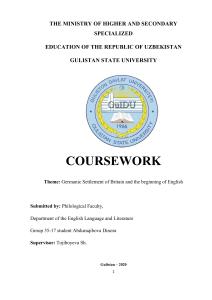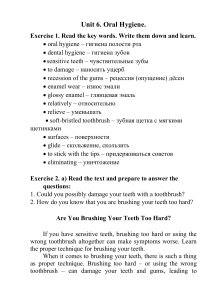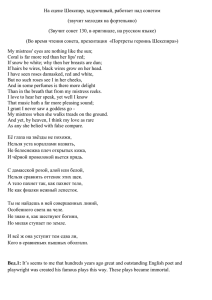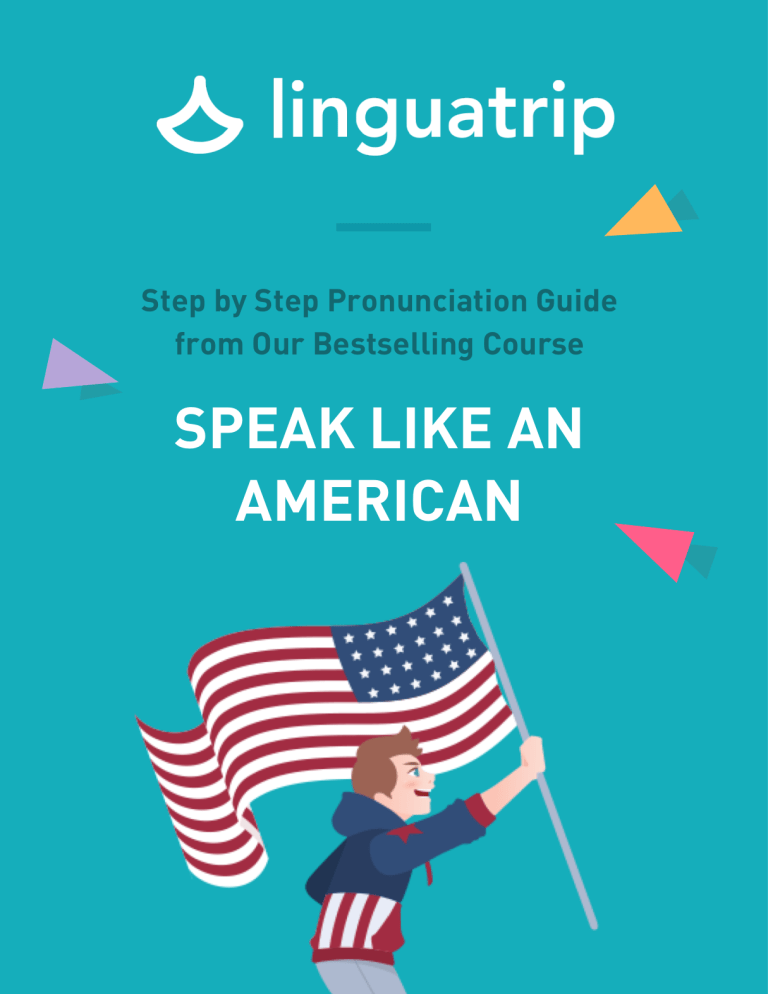
Step by Step Pronunciation Guide from Our Bestselling Course SPEAK LIKE AN AMERICAN PART 1 R It is considered one of the hardest English language sounds to articulate, and it is typically the last sound that native English speakers master as children. How to pronounce? Open your mouth slightly. Curl the tip of your tongue back without touching the top of your mouth. The tip of the tongue should not touch the gum ridge or your teeth when pronouncing the letter R. Do not create any kind of contact in your mouth! Tip from Venya Pak: Round your lips and keep in mind to say “o”, but master “r”. Don’t forget that in American English the sound is always pronounced. Try it: Red River Rocket Wrap / Rap Arrow Arrive R “R” accent reduction Whatever you do – do not create any kind of contact in your mouth. Unlike British English, in American English -R- is always pronounced. Just don’t roll it! Pay particular attending to R when it appears at the end of word: for, more, far and teacher. If it’s too difficult for you – you can start out by rounding your lips. Try it: Four-door car Her younger sister Sooner or later They’re never here Lobster for dinner Important information Thirty percent I heard it was a four-hour performance He normally works in New York Mark is determined to learn German Read the text out Two men are on an escalator. They are going down. Suddenly, somebody shouts, “Free burgers!” The men want the burgers. They must turn around. They must run up the escalator. They are going the wrong way. This is not easy for the men. They fall a few times. People watch them. They film them, too. In the end, the men get to the top. People start to cheer. Check yourself H A common error English language learners make is overproducing the /h/. In American English /h/ is very weak and gentle. Tip from Venya Pak: Just relax and breathe out saying the word. Yeah, that’s it! Good job! Try it: How His Her Hope Hey Hate Hip-hop Hello H V Your top teeth should be touching your lower lip. V Try it: Vodka Volleyball Very Vivid W Just round your lips. No contact with your lips or teeth. Tip from Venya Pak: Get surprised! Say “wow”. That’s it! Try it: Wow Was When Water Wow Was When W T Your tongue should press between the tooth ridge and the upper side teeth and touch the gum ringe Tip from Venya Pak: Think about drums and play an imaginary one with your mouth! Silent -t- after n The -t- after N is almost always silent in American English. Instead of saying internet Americans will frequently say [Innernet]. This is fairly standard speech. It’s not considered sloppy or overly casual. Try it: Interview Twenty Center Quantity Plenty T T between two vowels When -t- is between two vowels, it is generally pronounced like a fast /d/ sound. It also sounds similar to rolling r’s, when tip of the tongue touches the upper gum ridge. We also call it “tapped T” because you quickly tap the tip of your tongue on the gum ridge when you pronounce it. T becomes a fast /d/ in the following cases: A. BETWEEN TWO VOWELS (Natives don’t say /BETTER/ – they say /BEDDER/) B. BEFORE AN -L(Natives don’t say /LITTLE/ – they say /LIDDLE/) C. AFTER -R- AND A VOWEL (Natives don’t say /PARTY/, /FORTY/ – they say /PARDY/, /FORDY/) D. BETWEEN TWO SEPARATE WORDS when the FIRST WORD ENDS WITH A VOWEL + T and the SECONS BEGINS WITH a VOWEL (it is, what if, wait a minute) ATTENTION: -T- DOESN’T CHANGE to a /FAST D/ if it’s within a stressed syllable. Natives don’t say /ADACK/ – they say /ATTACK/ Try it: City Better Duty Total Matter Meeting Quality At eleven Put it on Eat out Get up I’ll eat it a little later Peter wrote a better letter He brought a lot of bottles of water D The articulation is the same like when you pronounce /t/ but with vocal vibration. Try it: Do Two Take Date Day Toy Table Toilet Desk Don’t take Time to do D Read the text out Once, I took my daughter to a park. We ran into a boy from her school and he asked me, "How are you doing, sir?" He is a really nice kid Check yourself N-NG In American English, the final G in the ING endings should not be dropped, but it should not be over-pronounced either. Don’t say “I’m goin shoppin” and don’t say “I’m going shopping”. To create the right sound – raise the back of the tongue and let it touch the soft palate, which is the soft area at the rear of your mouth. MAKE SURE THE TIP OF YOUR TONGUE DOES NOT TOUCH YOUR TEETH! Try it: N Doing nothing Something wrong Looking young Feeling strong Wedding ring To make N sound – you just need to touch your upper teeth with the tip of your tongue. Try it: Thin – Things Ran – Rang Win – Wing Ban – Bang It’s a pretty normal thing. He comes running to you every night. I will give you nothing. N Read the text out Hey! How’s it going? I know, we haven’t talked in a long time, but I really do feel like we’ve been there for each other all along! Check yourself Explanation by Venya TH Your tongue is stiсking out a little bit while you are blowing out air. Tip from Venya Pak: Imagine that today is your B-Day and you have a cake with candles that you have to blow out. But you have an allergic reaction and your tongue is swallen. There are voiced and unvoiced TH. For the UNVOICED /th/ we use only air. For the VOICED one - we use air and voice vibration (like /z/) TH Try it: Voiced TH breathe clothing father this weather Unvoiced TH anything both earth nothing thing Read the text out Her thirty-third birthday is on the third Thursday of this month. Those three things are worth thousands of dollars. There are those that always tell the truth. I’d rather buy this one than that one. Check yourself Explanation by Venya PART 2 Sounds /æ/ & /ɛ/. MAN vs. MEN In order to pronounce the sound /æ/ like in a word MAN or BAD, you need to open your mouth and drop the jaw as much as possible. If you don't open your mouth wide enough, you'll get a totally different sound /ɛ/ as in MEN or BED. LIPS: open, not rounded TONGUE: Low and flat on the floor of the mouth. SPELLING: A (hat, apple, man) in a closed syllable (the one ending with a consonant letter). Try it: Bad example National anthem Accurate answer Bad habit Practice these sentences: This is your last chance to give me an accurate answer Sam sat at the back of the math class Danny had a salad and a sandwich in the cafeteria Nancy had a bad attitude in her Spanish class Kathy would rather study acting at the national academy æ LONG AND SHORT /i/ Long /i/ as in SEAT and short /ɪ/ as in SIT sounds. For long /i/ sound you to follow these instructions: LIPS: Slightly smiling, tense, not rounded TONGUE: Tense, high and far forward near the roof of the mouth. SPELLING: -ee (meet, feet); -ea (team, sea); -ie or -ei (piece, neither); final -e (me, we); final -y (duty, city); endings with -ique (unique, critique). Try it: The employees agreed to meet at eight fifteen. Don’t keep the TV near the heater. It’s extremely easy to cheat when the teacher isn’t here. Steve will read the email before he leaves. For a short /ɪ/ sound you need to have your lips slightly parted and your tongue relaxed and high but not as high as for /i/. Sides of the tongue should touch upper back teeth. SPELLING: i (sit, give); ui (build, quit); y between to consonants (gym, system) EXCEPT FOR: been (in US ENG), women (wimin), busy (bizzy). Try it: Kim will visit her big sister Linda in Virginia In the beginning it was difficult for Jim to quit drinking The city has an interesting history Keep in mind that spelling with these sounds is a bit tricky as there are a lot of exceptions. Now try to feel the difference between these sounds /i/ and /I/: leave / live feel / fill least / list beat / bit each / itch feet / fit sheep / ship Check yourself Sounds /ʊ/ and /u/. GOOD & MOOD The main difference here is rounding your lips. For the sound /ʊ/ as in GOOD you don't round your lips at all. SPELLING: oo (good, look), u (push, full) , ould (would., should). EXCEPTION: Woman Try it: good book took a look fully cooked push and pull The sugar cookies taste good. He would read the book if he could Would you help me look for my book? In order to make a sound /u/ as in MOOD, you should round your lips as if you are blowing a balloon. SPELLING: oo (too, food, school), ue (true, blue), o (do, who), ew (new, blew), u (super, rule) Try it: too few soup spoon new moon two rooms The new roof was installed in June. I need proof that you’re telling the truth. Contrast version: Full / Fool Look / Luke Pull / Pool Stood / Stewed Check yourself ʊ SOUNDS /ʌ/ AND /ə/ These are two very lazy English sounds. We pronounce Sounds /ʌ/ as in MUG and /ə/ as in SURPRISE In order to articulate the sound /ʌ/ you need to have your lips totally relaxed and slightly parted. Your tongue should be also relaxed and be in the middle of your mouth. Try it: young son jump up fun in the sun number one What country does he come from? I love the sunny summer months. Your younger brother doesn’t trust us. For /ə/ you put minimum effort and don't round your lips. You just slightly open your mouth. Remember - this sound is only pronounced in unstressed syllables Read this text aloud and practice pronunciation: They got on the crowded subway train. They sat down on the plastic seat. They sat next to a man. He was an old man. He was talking. He was talking to himself. He looked at them. He raised his voice. “You’re not smart,” he said. “Did you hear me? Did you hear what I said? You think you’re so smart.” He smelled of alcohol. He was holding something. It was in a small paper bag. “Let’s move,” Natalie whispered. Adrian agreed. They got up. They walked about 20 feet away. They found another seat. “This is better,” she said. “He smelled bad.” Adrian nodded. “Oh, no,” she said. “What’s wrong?” Adrian asked. “I think he’s coming our way,” she said. The man was walking toward them. He sat down across from them. “See? You’re not smart,” he said. “You think you’re so smart. But I found you, didn’t I?” Check yourself PART 3 STRESSES IN WORDS AND SENTENCES In English, certain words have stress within a sentence, as well as, certain syllables have stress within a word. The stressed syllable is usually: • Slightly higher in pitch • Slightly longer ABOUT A • BOUT A word can sometimes have 2 stresses: a main stress and a secondary stress which is less emphasized that the main one. EMBARRASSMENT EM • BA • RRASS • MENT Main stress on BA, secondary stress on EM. SENTENCE STRESS Sentence stress allows us to understand the meaning and pick up on the important parts of your statements. We can stress any word (except for prepositions, conjunctions, and particles) in a sentence depending on what exactly we wish to emphasize. I saw her at the party. We can put a stress on her, if we want to point out that we saw exactly her. We can put a stress on saw, if we say that we only saw her (didn't talk to her) and so on. Sentence stress can change depending on the mood you're trying to convey. SIT DOWN SIT DOWN SIT DOWN INTONATION The English language has a set of rules for sentence intonations. In order to sound like a native you need to master these rules as they might be different from your mother tongue. Affirmative sentence Intonation goes down by the end of the sentence. Yes/No Questions Intonation goes up by the end of the sentence. Informative (Wh-) questions Intonation goes down by the end of the sentence Alternative (OR) questions Intonation goes up at the first choice (second, third, etc if there are several variants) and goes down by the last variant. TAG questions If we want to learn something (as we don't know the needed information) intonation goes down by the end of the main sentence and rises at the tag. If we are unsure and want to simply clarify something, intonation goes down from the start and drops at the tag Read this text aloud and practice pronunciation: I’ll pick you up at nine. Do you like roses or sunflowers? Are you okay? Если хочешь прокачать свой акцент и заговорить как настоящий носитель, добро пожаловать на наш интенсив «Говорим поамерикански». За 14 уроков изучим самые сложные моменты и сделаем всё возможное, чтобы улучшить произношение. Используй промокод SPEAKFAST на странице оплаты и цена станет ниже на 20 $. Хочу курс со скидкой $20 OFF
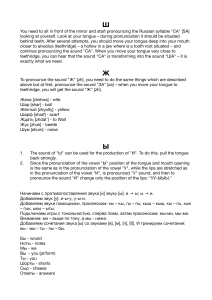
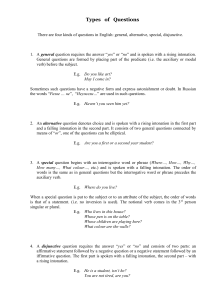


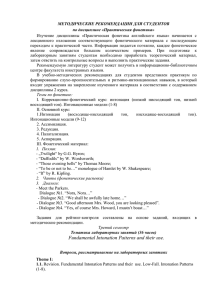

![The dictionary of body language [ENG]](http://s1.studylib.ru/store/data/006253876_1-cea408df18d074d3b40de69afd3af8ab-300x300.png)
